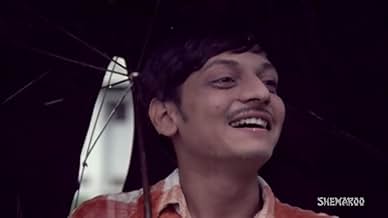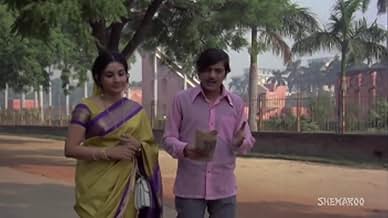Aggiungi una trama nella tua linguaA Delhi-based woman in a steady relationship with her boyfriend is forced to come to terms with her true feelings when a job interview in Mumbai brings an old flame back in her life.A Delhi-based woman in a steady relationship with her boyfriend is forced to come to terms with her true feelings when a job interview in Mumbai brings an old flame back in her life.A Delhi-based woman in a steady relationship with her boyfriend is forced to come to terms with her true feelings when a job interview in Mumbai brings an old flame back in her life.
- Premi
- 3 vittorie
Trama
Lo sapevi?
- QuizRajnigandha won the Filmfare award for Best film in 1975. It was the debut film for Amol palekar in Hindi film Industry.
- ConnessioniFeatured in Kahaani 2 (2016)
- Colonne sonoreRajnigandha Phool tumhare
Playback by Lata Mangeshkar (as Lata)
Recensione in evidenza
Rajnigandha (tuberose) is a celluloid adaptation of the Hindi story - Yahi Sach Hai (this only is true) written by the lady author Mannu Bhandari who is a big name in the world of Hindi literature. The director has nowhere digressed from the original story and presented it ditto on the screen.
The story - Yahi Sach Hai revolves around Deepa who loves Nisheeth while living in Calcutta but he breaks up with her without explaining anything to her. Heart-broken Deepa moves to Kanpur and comes in contact with Sanjay. In no time, love blossoms between the two. However when she visits Calcutta for a job interview, she meets Nisheeth again and the fire of her first love is rekindled in her heart. She starts feeling that her love for Sanjay was just an attempt to give solace to her broken heart and her first love is only the true love. But her dilemma continues whether she should opt for Sanjay or Nisheeth whose feelings can only be derived by her through his gestures, not expressed properly. However the ending scene of the movie brings a twist in the tale with the realisation coming upon Deepa that the heart of a woman (like her) is too weak to take tough decisions.
In the movie, the locations have been changed from Calcutta to Delhi and Kanpur to Bombay and the name of the character Nisheeth has been changed to Naveen (perhaps because Nisheeth is an uncommon name). Rest there is hardly any change. While the good story was the director's advantage on one hand, its thinness was the disadvantage on the other because, after all, an interesting movie of a duration of two hours or more was to be presented to the Hindi movie audience. Hence here lay the challenge for him and the litmus test of his ability to keep the viewers tied to the screen throughout. And admittingly, Basu Chatterjee passed this test with distinction. He has directed many bad movies too but Rajnigandha is definitely one of his best works.
The name of the movie is fittingly Rajnigandha because the hero Sanjay is habitual of bringing the gift of tuberoses (Rajnigandha) for Deepa who loves these flowers. And the fragrance of love spreading in a woman's heart is no less than the enchanting fragrance of tuberoses.
The story (and the movie) tries to peep into a woman's heart and explores an answer to a question - Can a woman love two men at the same time ? The answer from the viewpoint of the storyteller (who is a woman) is - Yes. It may happen when one of the two men is her first love. The first love always remains in a woman's heart because of the fragrant memories it carries. However love is not just an emotion. It's a need for every human-being (from my viewpoint - every creature) which should be met. Hence, it's just not practical to spend the remaining part of one's life with a broken heart and memories of a bygone love affair. The lovelorn Deepa finds solace in the arms of the outspoken Sanjay whereas the bygone love of introvert and silent Nisheeth (or Naveen) is very difficult for her to discard from her heart . Yet, in the end, when she is almost tired of the wait for Nisheeth's letter, all of a sudden Sanjay breaks into her room with her favourite tuberoses and her craving need for love overpowers her abstract emotion. Then she feels that this love-drenched moment is only true, rest everything is (and was) false.
Personally (though I am a man), I feel Deepa comes across the truth in the end because we live (and relive) in memorable moments of life. A moment of victory, a moment of love, a moment of satisfaction or a moment of bliss overpowers an uneventful and repetitive routine of a lifetime. Hence the golden moments are not to be let gone or wasted. They are to be lived to the full. And the bliss gained in a few moments is better than a treasure of stale memories and false, unfulfilled expectations.
The emotional story has been told nicely on the screen and there is no boredom. All the three lead actors - Vidya Sinha as Deepa, Amol Palekar as the extrovert Sanjay and Dinesh Thakur as the introvert Naveen have delivered admirable performances.
Technically the movie is simple and simplicity itself was the pre-requisite of this emotional story of middle-class people. Hence acceptable. Music is a very big plus point of the movie. It contains only two songs, written by Yogesh and composed by Salil Chowdhury but they can very easily be counted among 100 best songs of bollywood - 1. Rajnigandha Phool Tumhaare Mehken Yun Hi Jeevan Mein, Yun Hi Mehke Preet Piya Ki Mere Anuraagi Mann Mein (sung by Lata), 2. Kai Baar Yun Bhi Dekha Hai, Ye Jo Mann Ki Seema Rekha Hai, Mann Todne Lagta Hai (sung by Mukesh). The lyrics have a high poetic quality and the music composition of both of them is just excellent.
All in all, Rajnigandha is a very good emotional watch. However, with my recommendation for the movie, I also advise those who can read Hindi and are fond of good literature, to read the story - Yahi Sach Hai which is a gem from the treasure of Hindi literature.
The story - Yahi Sach Hai revolves around Deepa who loves Nisheeth while living in Calcutta but he breaks up with her without explaining anything to her. Heart-broken Deepa moves to Kanpur and comes in contact with Sanjay. In no time, love blossoms between the two. However when she visits Calcutta for a job interview, she meets Nisheeth again and the fire of her first love is rekindled in her heart. She starts feeling that her love for Sanjay was just an attempt to give solace to her broken heart and her first love is only the true love. But her dilemma continues whether she should opt for Sanjay or Nisheeth whose feelings can only be derived by her through his gestures, not expressed properly. However the ending scene of the movie brings a twist in the tale with the realisation coming upon Deepa that the heart of a woman (like her) is too weak to take tough decisions.
In the movie, the locations have been changed from Calcutta to Delhi and Kanpur to Bombay and the name of the character Nisheeth has been changed to Naveen (perhaps because Nisheeth is an uncommon name). Rest there is hardly any change. While the good story was the director's advantage on one hand, its thinness was the disadvantage on the other because, after all, an interesting movie of a duration of two hours or more was to be presented to the Hindi movie audience. Hence here lay the challenge for him and the litmus test of his ability to keep the viewers tied to the screen throughout. And admittingly, Basu Chatterjee passed this test with distinction. He has directed many bad movies too but Rajnigandha is definitely one of his best works.
The name of the movie is fittingly Rajnigandha because the hero Sanjay is habitual of bringing the gift of tuberoses (Rajnigandha) for Deepa who loves these flowers. And the fragrance of love spreading in a woman's heart is no less than the enchanting fragrance of tuberoses.
The story (and the movie) tries to peep into a woman's heart and explores an answer to a question - Can a woman love two men at the same time ? The answer from the viewpoint of the storyteller (who is a woman) is - Yes. It may happen when one of the two men is her first love. The first love always remains in a woman's heart because of the fragrant memories it carries. However love is not just an emotion. It's a need for every human-being (from my viewpoint - every creature) which should be met. Hence, it's just not practical to spend the remaining part of one's life with a broken heart and memories of a bygone love affair. The lovelorn Deepa finds solace in the arms of the outspoken Sanjay whereas the bygone love of introvert and silent Nisheeth (or Naveen) is very difficult for her to discard from her heart . Yet, in the end, when she is almost tired of the wait for Nisheeth's letter, all of a sudden Sanjay breaks into her room with her favourite tuberoses and her craving need for love overpowers her abstract emotion. Then she feels that this love-drenched moment is only true, rest everything is (and was) false.
Personally (though I am a man), I feel Deepa comes across the truth in the end because we live (and relive) in memorable moments of life. A moment of victory, a moment of love, a moment of satisfaction or a moment of bliss overpowers an uneventful and repetitive routine of a lifetime. Hence the golden moments are not to be let gone or wasted. They are to be lived to the full. And the bliss gained in a few moments is better than a treasure of stale memories and false, unfulfilled expectations.
The emotional story has been told nicely on the screen and there is no boredom. All the three lead actors - Vidya Sinha as Deepa, Amol Palekar as the extrovert Sanjay and Dinesh Thakur as the introvert Naveen have delivered admirable performances.
Technically the movie is simple and simplicity itself was the pre-requisite of this emotional story of middle-class people. Hence acceptable. Music is a very big plus point of the movie. It contains only two songs, written by Yogesh and composed by Salil Chowdhury but they can very easily be counted among 100 best songs of bollywood - 1. Rajnigandha Phool Tumhaare Mehken Yun Hi Jeevan Mein, Yun Hi Mehke Preet Piya Ki Mere Anuraagi Mann Mein (sung by Lata), 2. Kai Baar Yun Bhi Dekha Hai, Ye Jo Mann Ki Seema Rekha Hai, Mann Todne Lagta Hai (sung by Mukesh). The lyrics have a high poetic quality and the music composition of both of them is just excellent.
All in all, Rajnigandha is a very good emotional watch. However, with my recommendation for the movie, I also advise those who can read Hindi and are fond of good literature, to read the story - Yahi Sach Hai which is a gem from the treasure of Hindi literature.
- jmathur_swayamprabha
- 25 giu 2010
- Permalink
I più visti
Accedi per valutare e creare un elenco di titoli salvati per ottenere consigli personalizzati
- How long is Rajnigandha?Powered by Alexa
Dettagli
- Paese di origine
- Lingua
- Celebre anche come
- Раджнигандха
- Vedi altri crediti dell’azienda su IMDbPro
- Tempo di esecuzione1 ora 50 minuti
- Mix di suoni
Contribuisci a questa pagina
Suggerisci una modifica o aggiungi i contenuti mancanti

Divario superiore
By what name was Rajnigandha (1974) officially released in Canada in English?
Rispondi



















